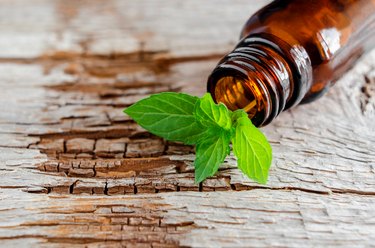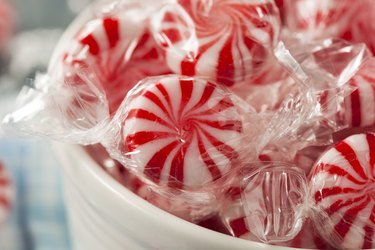
Curious to compare peppermint extract versus peppermint oil? If you're a fan of this minty flavor, it's probably best to have both on hand, because they serve different purposes.
The extract is a staple for minty recipes like candy cane chocolate bark, peppermint hot chocolate and mint milkshakes. Peppermint oil is more often used for aromatherapy. It's no surprise this refreshing essence appears in so many delicious foods and scents, as peppermint can be soothing and comforting (hello, peppermint tea).
Video of the Day
Video of the Day
If you don't have fresh mint leaves on hand, peppermint extract will come in handy. But, for times you don't have either, you may wonder if you can substitute peppermint oil in a recipe. Here's how to swap peppermint extract and oil in baking.
Swapping Peppermint Oil for Extract
Generally, you should use a third to half of the amount in a recipe when you use essential oil to substitute peppermint extract.
When it comes to peppermint oil conversion — flavoring with peppermint oil rather than extract — there's no exact measurement, and this tends to be true when baking with natural extracts of all kind.
What's important to remember is that essential oils are incredibly potent. According to Mather Hospital, you should start with just one to two drops of the essential oil. Alternatively, you can use what's called the "toothpick method," where you dip a wooden toothpick into the bottle to absorb the oil. Once the toothpick is soaked, you can swirl it through the wet ingredients in your recipe. Taste the dish, and add more flavor gradually as needed.
Peppermint Oil vs. Peppermint Extract
Both peppermint extract and oil come from the same plant: Mentha ×piperita L. It's native to many parts of North America, according to the USDA. Though they are made from the same plant, the oil and extract of peppermint are not the same.
The main difference between peppermint oil and extract is the concentration. Plant extracts are diluted with alcohol and other liquid ingredients, so they are less potent. Oils are not diluted, making them far more concentrated.
Essential oils are concentrated plant extracts that may have potential benefits. They're made by squeezing the plant until the oils are released, per the Cleveland Clinic. Because they are often pure oils, essential oils are commonly used for their aroma.
Warning
Too much peppermint can be harmful. Because it's so concentrated, the U.S. National Library of Medicine warns of peppermint oil overdose, which can occur when you take in more than the recommended amount (intentionally or accidentally). A peppermint oil overdose can lead to symptoms such as slow heartbeat and dizziness.
There are other dangers of peppermint. Taking peppermint oil orally can lead to other symptoms, including heartburn, nausea, abdominal pain and dry mouth, per the NIH. It is rare but possible for peppermint oil to cause allergic reactions.
How to Substitute Peppermint Oil for Peppermint Extract
You might be wondering: Can I use peppermint extract in place of peppermint oil? Peppermint extract is more commonly used in baking as it's more affordable and widely available. But, one of the cons of using peppermint extract is that the alcohol burns off quickly during cooking, taking some of the peppermint flavor with it.
That's why you need more peppermint extract to yield similar results as using peppermint oil. Still, peppermint oil works as a substitution.
Plant extracts such as peppermint extract can also have a more synthetic flavor, says Chinelo Awa, a professional cake maker in London and owner of Good Cake Day.
Awa recommends using peppermint oil in place of peppermint extract wherever possible as its higher concentration yields a stronger flavor. She recommends using about half the amount of peppermint oil in place of peppermint extract, noting that you can start with smaller amounts and increase as needed because you may need less.
Warning
There are certain essential oils that should never be consumed. These include arborvitae, birch, cedarwood, cypress, eucalyptus, white fir and wintergreen, per Mather Hospital.
How to Substitute Peppermint Extract for Peppermint Oil
There may be times when you prefer to use peppermint extract, especially if it's your only option. It's also more affordable and generally easier to find in most grocery stores than peppermint oil.
If a recipe calls for peppermint oil but you choose to use peppermint extract, you'll need to adjust the recipe.
"It's important to remember that peppermint oil and peppermint extract are not the same — and that peppermint oil is a lot stronger," says Michael Johnson, a private chef from Brighton, England. "Peppermint extract is usually not as concentrated and contains alcohol."
You can replace peppermint oil with about three times the amount of peppermint extract, Johnson says. Like Awa, he recommends increasing the amount as needed, as you may need more peppermint extract to yield similar results as potent peppermint oil.


